- Home
- Maggie O'Farrell
The Hand That First Held Mine Page 7
The Hand That First Held Mine Read online
Page 7
Look at her, standing there on the pavement. She looks different from the Lexie in Innes’s room, the one naked under a candy-striped shirt. She looks different from the Alexandra in a blue dress and yellow kerchief, sitting on a tree stump in her parents’ garden. She’ll have many incarnations in her time. She is made up of myriad Lexies and Alexandras, all sheathed inside one another, like Russian dolls.
She has her hair pinned up. She is wearing the red and grey livery of the shop, the regulation red scarf tied around her throat, the corded hat stuffed in her pocket. Her coat is belted at the waist and is rather hot for this warm afternoon. Look at how high, how tense her shoulders are. You can’t be unflinchingly polite to people all day without feeling the strain. She’s loosening the scarf from her neck, pulling it free and stuffing its scarlet length into her other pocket. She is rubbing her shoulders, trying to ease the stiffness. She smiles at two other lift girls as they come out of the door. She watches as they head, arm in arm, up the crowded pavement, wobbling a little on their patent-leather heels. A bus chunters past, the sound of its bell creating a clear, widening circle in the air.
She breathes in. She breathes out. Her shoulders lower a fraction. She looks up at the bright strip of sky balanced on top of the buildings, then sets off across the street, leaving the department store, the lift, its buttons, its dinging bell, behind her until tomorrow. She has to dash because another tram is coming, a car hoots just as she reaches the pavement and she has to sidestep a man pushing a cart full of flowers, and she feels something like laughter crowd up into her throat. Or not laughter. What is it? She turns the corner and is suddenly drenched in low evening sun, the pavements and streets striated by long, spiked shadows. A newspaper seller is coming towards her, repeating two drawn-out syllables: ‘Eeeeeee Nuuuuuuus, Eeeeeeee Nuuuuuuus.’ And Lexie decides: glee. What she feels is utter, unadulterated glee. She is on her way to meet a university friend who has been in London a year, and they are to go to the pictures together. She is working for herself, she has a place to live, she has made it to London and the feeling is glee.
‘Eeeeeee Nuuuuuuus,’ the newspaper seller calls again, the sound behind her now. She leaps off the pavement, with a glance over her shoulder, and crosses the road, and when she gets to the opposite pavement, she begins to run, swinging her bag, opening her coat. Ah, the delirium of first realising you can do exactly what you want and that no one is going to stop you. People turn to look at her as she runs, an old woman tuts and she can still hear the long, mournful cries of the newspaper seller: ‘Eeeeeee Nuuuuuuus . . .’
She gets back to Kentish Town late, but not so late, she is relieved to find, that Mrs Collins has bolted the door. She struggles for a minute with the key, then the lock gives, she steps inside and closes the door carefully behind her. But instead of the dim, hushed hallway she was expecting, the lights are blazing and there is a cacophony of chatter and laughter coming from somewhere. A number of people are sitting on the stairs. Lexie recognises several women who have bedsits in the house.
Puzzled, she heads towards them. Is someone having a party? Does Mrs Collins know about this? Maybe she’s out for the evening.
‘Oh, here she is!’ someone cries, as Lexie comes towards them.
‘We were getting worried,’ Hannah says, leaning round someone else’s back. She has a glass in her hand, Lexie notices, and her cheeks are a little flushed.
Lexie, unable to go any further even if she might have wanted to, starts to take off her coat. ‘I’m fine,’ she says, surveying them all. ‘I went to the pictures with a fr—’
‘She went to the pictures!’ Mrs Collins who, Lexie now sees, is perched on a chair on the landing, is calling up to unseen people on the next flight of stairs.
‘What’s going on?’ Lexie says, with a smile. ‘Are we having a house party?’
‘Well,’ Mrs Collins says, with a hint of her usual severity, ‘someone had to entertain your visitor.’
Lexie looks at her. ‘My visitor?’
Mrs Collins takes her arm and propels her through the thicket of legs and people. ‘Such an amusing young man,’ she says. ‘I don’t usually ask gentlemen in, as you know, but he did say he’d made an appointment with you and, to be frank, I was embarrassed on your behalf that you hadn’t seen fit to honour it and—’
Lexie and Mrs Collins and Hannah turn the corner to the next flight up and there, sitting on the fourth step, is Innes.
‘And what did he say when you told him?’ he is saying to a mousy girl with prominent gums. ‘I hope he was excessively sorry.’
‘Mr Kent has had us all playing a game,’ Mrs Collins says, squeezing Lexie’s arm. ‘We had to tell him about our most embarrassing moment ever. And he is going to decide which is the worst and whoever it is wins.’ She laughs wheezily, then seems to think better of it and covers her mouth with her hand.
‘Is that so?’ says Lexie.
Innes turns towards her. He looks her up and down. He gives a slight gesture with the hand that holds a cigarette which could be a wave or perhaps a shrug. ‘ There you are,’ he says. ‘We were wondering what had happened to you. Did you walk through the wrong door again? A portal to another world?’
Lexie puts her head on one side. ‘Not today, no. Just the door to the pictures.’
‘Ah. The lure of celluloid. There was some talk of you being abducted but I said you were the kind of girl who could see off any potential abductors.’
They regard each other for a moment. Innes narrows his eyes as he puts his cigarette to his mouth.
Hannah steps in. ‘Mr Kent was telling us he knew you from university.’
Lexie raises an eyebrow. ‘Was he indeed?’
‘That’s right,’ Innes cuts in, ‘and then these kind people took pity on me and invited me in. Someone had some brandy and your gracious landlady even provided me with some rissoles to eat. And there you have it. The whole story.’
Lexie can’t think of what to say next. ‘How were the rissoles?’ she comes out with.
‘Like none I have ever eaten.’ He stands, stretches, grinds his cigarette into an ashtray balanced on the step below him. ‘Well, I must be off. I’m sure you all need your sleep. Ladies, it has been a pleasure. I hope we can repeat it soon. Mrs Collins, you win the prize for the most embarrassing story. And perhaps you, Lexie, will see me out?’ He proffers his arm.
Lexie looks at the arm. She looks at him. All around her are cries of ‘Must you really leave?’, ‘What does Mrs Collins win?’, ‘What was Mrs Collins’s story again?’ She takes the arm and they walk together out into the hall. The crowd of women follow them to the bottom step, where they tactfully but reluctantly drop back.
Lexie thinks they will say goodbye at the front door but he pulls her through it. As soon as they are outside, Innes says, in a low voice, ‘Truthfully, they were the worst things I have ever eaten. The texture of sawdust, the taste of shoe leather. Don’t ever ask me to eat rissoles again.’
‘I shan’t,’ she says, then catches herself. ‘And I never asked you to in the first place.’
He ignores this. ‘What are rissoles anyway? What are they for? You’ll have to make it up to me.’
Lexie pulls her hand away from his arm. ‘What do you mean? And what are you doing here? How did you ever find me?’
He turns to her. ‘Do you know how many women-only rooming houses there are in Kentish Town?’
‘No, how would I know such a—’
‘Two,’ he says, ‘so it was really not that difficult. A simple process of elimination, balanced against chance. I knew you’d come soon, you see, knew you wouldn’t last much longer there. But I couldn’t be sure exactly when. All this is beside the point, anyway, because the point is, when are you coming to lunch with me?’
‘I don’t know,’ Lexie says, lifting her chin. ‘I’m rather busy.’
Innes smiles and moves a shade closer. ‘How about Saturday?’
Lexie pretends to be straightening her cuff.
‘I don’t know,’ she says again. ‘I work on Saturdays, I think.’
‘As do I. How about one o’clock? You’re allowed lunches, aren’t you? Where are you working? Did you reach your sixty words per minute?’
She stares at him. ‘How did you remember about the sixty words per minute?’ She starts to laugh. ‘And how on earth did you remember I was planning to live in a rooming house in Kentish Town?’
He shrugs. ‘I remember everything. It’s either a disability or a form of genius. I can’t decide which. Tell me something once and it’s there,’ he taps his head, ‘never to leave.’
She glances involuntarily at his cranium and imagines it, beneath his thick hair, teeming with information. ‘I don’t know what time I’ll finish. It’s my first week, so—’
‘All right, all right. I’ll tell you what. You come and find me. I’ll be at my office, in Soho. I’ll be there all day and probably all night. So any time. Come whenever you’re finished. I gave you my card. You still have it?’
Lexie nods.
‘Good. The address is on there. So I’ll see you Saturday?’
‘Yes.’
He smiles and hesitates for a moment. Lexie wonders if he is going to kiss her. But he doesn’t. He goes down the steps without a wave and crosses the street.
When Lexie reaches the fringes of Soho, she stops. She feels for Innes Kent’s note and business card, which she has kept in her bag since the day she met him. She doesn’t need to look but she does anyway. Editor, it reads, Elsewhere Magazine, Bayton Street, Soho, London W1.
Mrs Collins had been shocked that morning when Lexie came upon her on the stairs and let slip she was going to Soho later in the day. Lexie had asked her why. ‘Soho?’ Mrs Collins replied. ‘It’s full of bohemians and inebriates.’ Then she narrowed her eyes. ‘You,’ she said, and pointed at Lexie, ‘you’re always asking why, aren’t you? Curiosity killed the cat.’
Lexie laughed. ‘But I’m not a cat, Mrs Collins,’ she said, and ran the rest of the way down the stairs.
Lexie looks up the street that on her map is marked as Moor Street. It seems quiet for a place full of inebriates. There is one car parked at the side of the road; a man is standing in a doorway, reading a newspaper; there is an awning half closed above a shop; in a third-storey window a woman is leaning out to water some flowers in a window box.
Lexie takes one step into Soho, then another, and another. She has the odd sensation that she is motionless, that the pavement is moving under her and that the houses and buildings and street signs are reeling past. Her shoes make a clear toc-toc sound as she walks. The man with the newspaper looks up. The woman in the window pauses with her watering.
She walks past a shop with cheeses, big as wheels, stacked in the window. A man in a white apron is standing on the doorstep, shouting something in a foreign language to a woman with a baby across the street. He grins and nods at Lexie as she passes and she smiles back. Around the corner is a coffee-house, with men standing on the pavement outside, talking in a different language. They part, just enough to let her through, and one of them says something to her but she doesn’t look back.
The buildings are crowded together, dark brick, the roads narrow. The gutters run and ripple with the earlier rain. Around another corner, and another, past a Chinese grocer’s, where a woman is stacking pitted yellow fruits into a pyramid, past a doorway where two African men are sitting on chairs, laughing. A gaggle of sailors in blue and white uniforms are walking down the middle of the road, singing in staggered, off-key unison; a delivery boy on a bicycle has to swerve to avoid them and he turns to shout something over his shoulder. Two or three of the sailors seem to take exception and dart after him but the delivery boy pedals hard and disappears.
Lexie watches all this. She takes it all in. Everything she sees seems freighted with significance: the fluttering ribbon on one of the sailor’s hats, a marmalade cat washing itself on a window, the billow of steam that gathers in the air outside that bakery, the chalked words – Italian? Portuguese? – on a board outside a shop, the strains of music, interspersed with laughter, that wreathe up from a grating in the pavement, the fur-collared coat and gold-clasped bag of a woman passing on the opposite pavement. Lexie drinks it in, every detail, with a feeling between panic and euphoria: this is perfect, this is all perfect, it couldn’t be more perfect, but what if she can’t remember it all, what if even the tiniest element were to slip from her?
She arrives rather suddenly outside the address in Bayton Street. It is a building squeezed between two taller buildings, with a symmetrical arrangement of sash windows and steps up to the door. Paint is peeling in curls off the sills and gutters. A pane on the second floor is missing.
Beyond the windows on the ground floor, Lexie can see a great number of people. Two men are peering at something they are holding up to the light; there is a woman on the phone, nodding, writing. Another woman is measuring a piece of paper with a ruler, talking over her shoulder to a man at the desk behind hers. In a corner of the room a group of people are bunched together, crowding round to look at some pages pinned to the wall. And there, next to the men holding something up to the light, jacketless, with his sleeves rolled up, is Innes.
Innes is, at this very moment, electrified by his magazine. The whole thing is being redesigned – the look, the content, the feel of it. The relaunched issue will feature an artist whom Innes believes will make an impression, will leave her footprint on history, will be remembered long after all these people have crumbled to dust.
And dust is something that is preoccupying him greatly today. Because this artist works with white clay, brushed and planed so smooth it assumes the texture of warmed infant flesh, making it imperative that—
Flesh? Innes’s thoughts trip and stumble on the word. ‘Flesh’ is not a good word. Does it necessarily denote death? No, he decides, but the implication is enough to banish it from the paragraph he is privately composing in his head as he points out to the photographer that his lens must have been covered in dust when he shot this roll because the clarity, the slightly impure white that is the artist’s signature, is by no means apparent.
Innes’s mind is running on several planes. He is thinking, will the magazine masthead be all right at an angle like that, will it set off the plainness of the new font, I want the font to be plain, Helvetica perhaps, or Gill Sans, definitely not Times or Palatino, it must not fight for attention with the shot of the sculpture. He is thinking, warmed infant skin? No. Does he need the word ‘infant’ at all? Warmed skin? Warmed flesh? Does the juxtaposition of ‘warmed’ with ‘flesh’ expunge any overtones of death? He is thinking, will I trust Daphne to call the printers or shall I see to it myself?
As he crosses the room he looks out reflexively at the street, and so preoccupied is he with his magazine, with the impending font decision, with his article, that the image of the woman outside enters his mind and takes up a place there as a noise from the external world will incorporate itself into a sleeping man’s dream. Innes immediately pictures this woman sitting with a typewriter at the desk next to his, her neat ankles crossed, her hand supporting her chin, that neck of hers turned so that she can look down at the street.
He stops in his tracks. The masthead must not be at an angle after all. It must be straight and at the bottom of the cover, justified right. It’s never been done before! The font must be Gill Sans, bold, forty-eight point, lowercase, like so:elsewhere
and the shot of the sculpture will float above as if the masthead, the name of the magazine itself, is the floor, the essential strut, the jumping-off point for the work. Which, in a way, Innes tells himself, it is!
‘Stop!’ Innes cries, at the layout man. ‘Wait. Put it here. At the bottom. Like this. No, here. Gill Sans, bold, forty-eight point. Yes, Gill Sans. No. Perfect. Yes.’
The men with the contact sheet, Daphne on the phone, the visiting film critic and the layout man watch, unsurprised, as Innes stares at it for a moment, then bur
sts out through the door.
Suddenly Innes Kent is leaping down the steps. ‘You,’ he is saying. ‘You took your time. Come here this instant.’ He throws his arms wide.
Lexie blinks. She is still holding her map and his business card. But she moves towards him – how can she not? – and he envelops her in an embrace. Her face is pressed against the cloth of his suit and it registers somewhere that its nap is something familiar. She touches it with a fingertip, then pulls back to look. ‘Felt,’ she says.
‘I beg your pardon?’
‘Felt. Your suit is made of felt.’

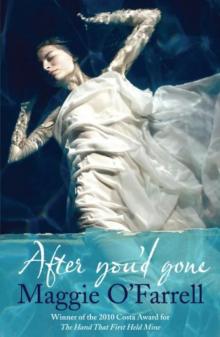 After You'd Gone
After You'd Gone The Hand That First Held Mine
The Hand That First Held Mine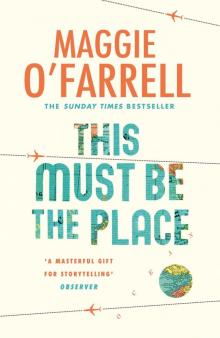 This Must Be the Place
This Must Be the Place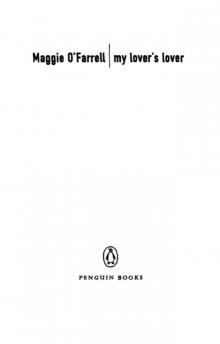 My Lover's Lover
My Lover's Lover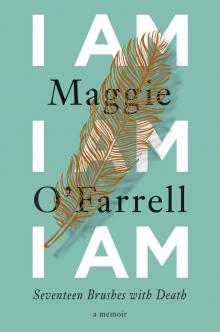 I Am, I Am, I Am: Seventeen Brushes With Death
I Am, I Am, I Am: Seventeen Brushes With Death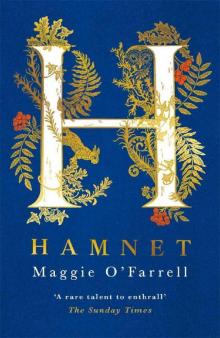 Hamnet
Hamnet Hamnet and Judith
Hamnet and Judith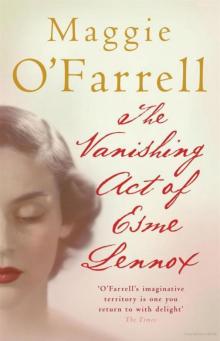 The Vanishing Act of Esme Lennox
The Vanishing Act of Esme Lennox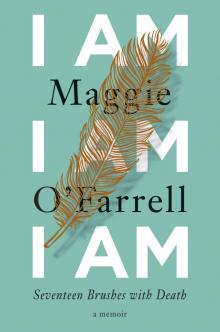 I Am, I Am, I Am
I Am, I Am, I Am